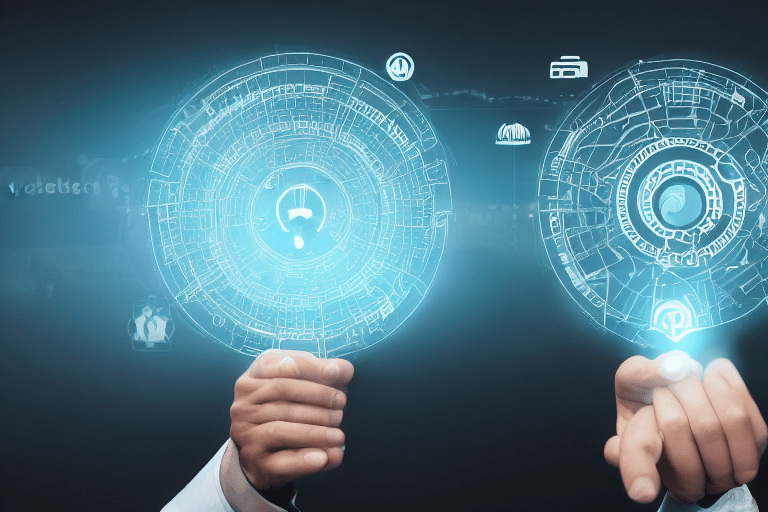If you thought artificial intelligence only existed in the movies, think again. AI is becoming more and more prevalent in our everyday lives, and you may not even realize it. Here are 10 mind-boggling ways AI could impact your life.
Artificial intelligence in health care: improving patient outcomes
Artificial intelligence has the potential to improve patient outcomes in a variety of ways. For example, AI could help doctors diagnose and treat diseases more accurately. It could also help doctors better manage chronic illnesses and monitor patients’ health conditions more effectively. In addition, AI could help doctors prescribe the right medications for patients.
AI has also been used to improve patient care in other areas. For example, AI can help doctors identify potential risks before surgery. AI can also help doctors recommend treatment options to patients. AI can also help doctors monitor patients’ health conditions after they leave the hospital.
As artificial intelligence continues to develop, it is likely that it will play an even bigger role in patient care. In the future, AI may even be able to diagnose and treat diseases on its own. This would save patients time and money.
Artificial intelligence in the workplace: enhancing productivity
Artificial intelligence is quickly becoming a staple in the workplace, with many businesses looking to harness its potential for enhanced productivity. Here are 10 ways AI is already helping to improve workplace efficiency and productivity:
-
Automated data entry: AI can help automate data entry processes, freeing up employees to focus on more important tasks.
-
Improved customer service: AI can help provide better customer service by automatically tracking and analyzing customer interactions.
-
Improved product quality: AI can help improve product quality by identifying and correcting manufacturing errors.
-
Enhanced marketing campaigns: AI can help create more effective marketing campaigns by automating the analysis of data collected from social media platforms and other sources.
-
Enhanced employee productivity: AI can help employees become more productive by providing them with tailored information and instructions.
-
Reduced office costs: AI can help reduce office costs by automating tasks that are currently performed manually.
-
Reduced waste: AI can help reduce waste by automatically identifying and correcting errors in paperwork and other documents.
-
Increased safety: AI can help increase safety by monitoring workers and alerting supervisors if there is a potential safety issue.
-
Increased customer satisfaction: AI can help increase customer satisfaction by providing accurate information about product availability and pricing.

Artificial intelligence and education: personalizing learning experiences
One of the most profound ways artificial intelligence (AI) is changing education is by personalizing learning experiences. AI can keep track of a student’s progress and offer personalized recommendations. For example, if a student falls behind in their class, AI could suggest supplemental materials that they might not have considered before. Additionally, AI can be used to analyze data from exams and other educational assessments in order to develop personalized feedback for students. This type of technology has the potential to change how we learn and pursue academic goals.

Artificial intelligence in retail: delivering a personalized shopping experience
Retailers are constantly looking for ways to personalize the shopping experience for their customers. Artificial intelligence can play a big role in this by delivering tailored recommendations and recommendations based on past purchases.
Artificial intelligence can also help retailers predict customer needs and preferences. This can help retailers identify products that a customer may be interested in, even if they haven’t yet made a purchase.
Retailers can also use artificial intelligence to automate tasks that would traditionally be handled by human employees. This can save time and money, and free up employees to focus on more important tasks.
Artificial intelligence is already being used in some retail settings, and there is no doubt that it will continue to grow in popularity. Retailers who are able to harness the power of artificial intelligence will be able to provide their customers with an even better shopping experience.

Artificial intelligence in transportation: making our roads and skies safer
Artificial intelligence is already playing a role in transportation systems, from monitoring traffic to providing warnings about potential accidents. In the future, it is likely that AI will be used more extensively in driving and routing, as well as in passenger interactions. Here are 10 ways artificial intelligence could impact your life:
- Driverless cars: Already being tested on roads around the world, driverless cars hold enormous potential for reducing congestion and saving lives. With AI guiding the vehicle, there would be less chance of accidents and less need for human drivers – potentially making our roads safer overall.
- Reservations for flights, trains and buses: Due to their massive scale, reservations systems are some of the most difficult tasks for humans to handle. By automating these processes using AI, we could cut waiting times at airports or reduce crowding on trains.
- Traffic control: Current traffic control methods rely on human observation and judgment – which can often be inaccurate because of conditions such as weather or lighting conditions. Using AI algorithms instead would make it easier to manage traffic flow while also ensuring safety concerns are taken into account.
- Warnings about road conditions: Collecting data from various sources (such as cameras, radar and sensors), AI can provide real-time alerts about dangerous road conditions ahead – helping drivers make informed decisions before they reach them. This could help prevent accidents and keep road users safe.
- Personalized shopping experiences: Currently, many online stores use artificial intelligence to personalize the buying experience based on a customer’s previous purchases (along with other demographic data). This technology has the potential to be used more broadly in retail settings – not just by online retailers but also traditional ones across all types of products and services.
- Scheduling appointments: Many people make appointments with doctors or other healthcare professionals using automated systems that offer specific time slots without requiring any input from patients themselves. By utilising machine learning techniques within this system, we could eventually see appointments made automatically according to patient needs rather than simply booked through scheduling software currently in use.
- Road construction planning: The development of new roads generally relies upon careful mapping of areas necessary for construction – something that can often depend heavily on human input over timedue to changes in terrain or population growth/shrinkage etc.. By equipping machines with deep learning capabilities this process could be greatly simplified – leading to faster completion times while maintain safety standards high throughout construction stages.
- Automatic payments: Currently, many automated services – such as those that pay the utility bills or deliver food – rely on user input such as account numbers or addresses. By incorporating AI into these systems, we could eventually see transactions made automatically without any need for human input. This would save time and effort for customers, while also reducing the risk of data breaches.
- Crowdsourcing live video streaming: Using artificial intelligence to crowdsource live video streams from different parts of the world has become a popular way to provide coverage of events and situations as they unfold. By using machine learning algorithms to analyze footage and make sense of it, this technology can allow for more accurate reporting in difficult or dangerous circumstances.
- Determining eligibility for government assistance: Human resources workers use a number of criteria to determine who is eligible for government assistance (such as income levels or family size). By utilising deep learning algorithms within a computer system, we could one day be able to automatically identify people who are most likely to require financial assistance. This would save time and stress for officials responsible for processing applications – while also ensuring that deserving individuals receive the support they need.

Artificial intelligence in government: improving service delivery
Governments are increasingly turning to artificial intelligence (AI) to improve service delivery. AI can help governments collect and analyze data more efficiently, identify and prevent fraud, and provide more accurate forecasts.
AI has already been used to improve public health by predicting outbreaks of disease and helping to identify patterns in health data. AI can also help governments manage resources more efficiently by identifying which programs are most effective.
As AI continues to evolve, it is likely that it will be used more extensively to improve government services. In the future, we may even see AI-powered governments that are able to provide accurate forecasts and manage resources more efficiently.
The potential applications of artificial intelligence are nearly endless, and its impact on our lives is only just beginning to be felt. In the coming years, AI will touch every aspect of our lives, from the way we get healthcare to the way we travel and shop. Its implications are both exciting and somewhat scary, but there’s no doubt that AI is here to stay.
